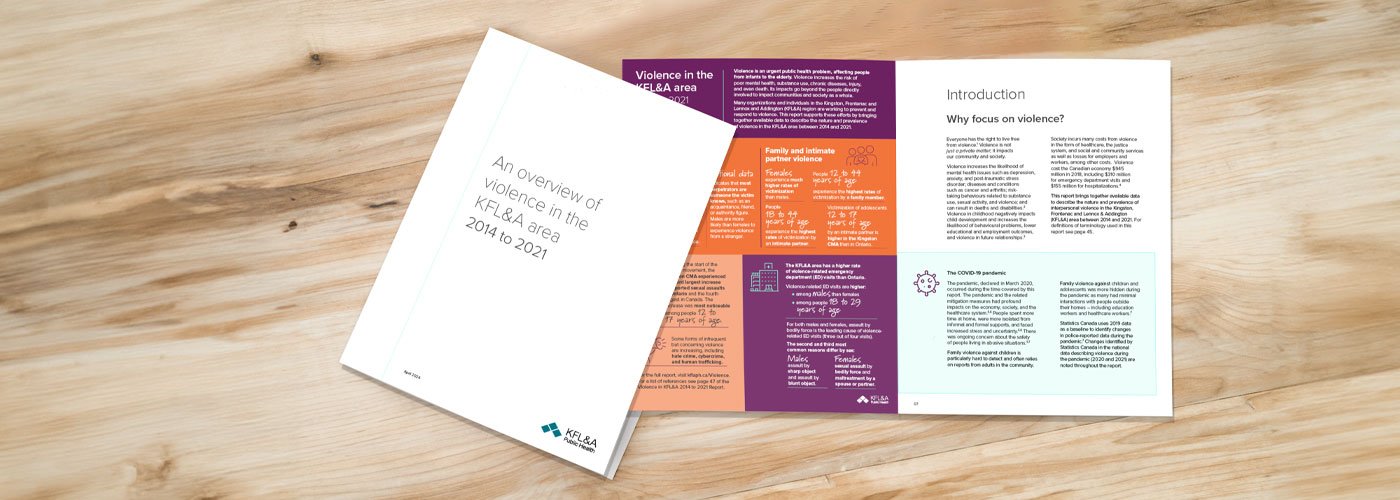Violence

Call 911 if you or someone else is in immediate danger.
KFL&A Public Health violence report
Many organizations and individuals in the Kingston, Frontenac and Lennox and Addington (KFL&A) region are working to prevent and respond to violence. This technical report supports these efforts by bringing together available data to describe the nature and prevalence of violence in the KFL&A area between 2014 and 2021.
Request your copy of the KFL&A Public Health violence report
We all have a role in stopping violence in our community.
Help prevent violence in the community |
|
There are things we can all do to help make our community safer for everyone:
|
Help children and youth stay safe from violence |
|
Parents and caregivers, educators, childcare providers, and other adults have a role in preventing violence between and against children and youth. Learn about parenting and non-violent discipline strategiesParenting comes with many unknowns and stressors. Using physical punishments (e.g., spanking, hitting, and pushing) is not okay, and is not effective for changing your child's challenging behaviours. Physical punishment teaches your child to use violence to solve problems, and it causes them to not trust you. Many people find it helpful to learn more about strategies to support their child’s development, respond to challenging behaviours and situations, and resources available for families in the community. Learn how to prevent and address violenceConflict between siblings is common. Parents have an important role to help children learn how to manage their emotions, communicate boundaries, and respectfully resolve conflicts with their siblings and peers. Children sometimes bully or abuse their siblings. This often involves a power imbalance that makes it hard for a child to protect or defend their self. Both the child being harmed and the child causing the harm need help when there is sibling violence. Learn more about how to recognize sibling violence. |
Ending violence when violence happens
Information and services are available to help people who experience violence, use violent behaviour, or know someone who is experiencing or using violence. Informal supports (e.g., neighbours, friends, family, educators, employers, co-workers, members of a faith community) can play a critical role in preventing and ending violence.
Job-protected leave is available through the Employment Standards Act for employees who experience domestic or sexual violence or whose child experiences domestic or sexual violence. Domestic violence means violence that happens between members of a home or a family unit.
Bullying |
| Bullying is aggressive behaviour that is meant to cause harm, fear, distress, isolate, or create a negative environment for another person. It usually involves repeated incidents or a pattern of behaviour towards a particular person or a group of people. Bullying happens in schools, workplaces, and other places . The use of the internet and technology to bully is called cyberbullying. No matter how you are experiencing bullying, there is support available. |
Child maltreatment |
| It is the law to report suspected child abuse and neglect. Contact Family and Children’s Services of Frontenac, Lennox and Addington (FACSFLA) in the KFL&A area. |
Elder abuse |
| Elder abuse refers to any form of physical, emotional, or financial mistreatment or neglect of an older person. The Seniors Safety Line is a 24-7, confidential and free resource for seniors experiencing abuse. Call 1-866-299-1011 for emotional support, safety planning, information and referrals. |
Family violence |
| Family violence is any form of violence, abuse or neglect experienced by a child or adult from a family member or from someone that they have an intimate relationship with. |
Gender-based violence |
|
Gender-based violence is any form of violence towards someone because of their gender, gender expression, gender identity or perceived gender. Young women face high levels of gender-based violence. Get advice on the most common gender-based violence issues facing young people, based on real searches from across Canada. |
Human trafficking |
|
National Human Trafficking Hotline: 24/7 confidential support: 1-833-900-1010 Human trafficking is a serious criminal offence and is one of the fastest-growing crimes around the world. Support is available for victims of human sex trafficking in Kingston and Frontenac, as well as for Indigenous women and youth and Indigenous communities in Napanee.
|
Intimate partner violence (IPV) |
|
IPV is all forms of violence that happen within an intimate partner relationship, including by a former partner. The violence can be physical, emotional, psychological, sexual, or financial. Other words used for this form of violence include domestic abuse, spousal violence, woman abuse, and dating violence. Support is available in Kingston and Frontenac, Lennox and Addington, and in northern areas of KFL&A. Help is also available for Indigenous women as well as in French and over 200 languages. The Kingston Frontenac Anti-Violence Coordinating Committee (FACC) IPV Survivors Handbook Resource Guide provides safety information and lists of community resources in the City of Kingston and County of Frontenac. iHEAL is a free, private, and secure app that helps women who are experiencing or have experienced IPV - as well as their family and friends - access information and resources to find personalized ways to stay safe and be well. Resources are available to help survivors with IPV-caused brain injuries. |
Sexual violence |
| Sexual violence is a violent, physical or psychological act by sexual means or by targeting sexuality. Sexual Assault Centre Kingston provides free, confidential and non-judgemental support for all survivors. Male survivors of sexual abuse can access 24-7 support by calling 1-866-887-0015. |
Technology-facilitated violence |
| Technology-facilitated violence is the use of technologies (e.g., computers, smartphones, and smart home devices) and digital platforms (e.g., websites, social media, and apps) to intimidate, embarrass, harass, or control someone. It includes many different behaviours, including sexual harassment, surveillance and stalking, revenge porn, impersonation, and doxxing. Technology is often used as part of other forms of violence, such as bullying and intimate partner violence. |
Workplace violence |
| The Occupational Health and Safety Act is in place to protect workers and ensure they are able to work in a safe and healthy workplace, including developing policies about workplace violence. There are many resources available to you and for employers to ensure work is safe. |
Youth dating violence |
| Youth dating violence are actions within a romantic or sexual relationship that involve aggression, violence, manipulation or threats. |
Information for employers
Employers can help to build a healthier and more productive workplace by preventing workplace violence and harassment.
Domestic or sexual violence leave |
|
Domestic or sexual violence leave is a job-protected leave of absence under the Employment Standards Act. |
Make It Our Business |
|
Make It Our Business provides information and education to help employers and other workplace stakeholders meet their obligations under the Ontario Occupational Health and Safety Act. |
Workplace sexual harassment and violence: Building safe workplaces training |
|
This training will increase employers’ awareness of sexual harassment and violence and provides an understanding of the Canada Labour Code. |
Sexual Harassment and Assault Resource Exchange (SHARE) |
|
SHARE supports workers in Ontario with experiences of workplace sexual harassment, workplace-related sexual assault, and gender-based harassment in the workplace. They have resources available with general legal information. |











